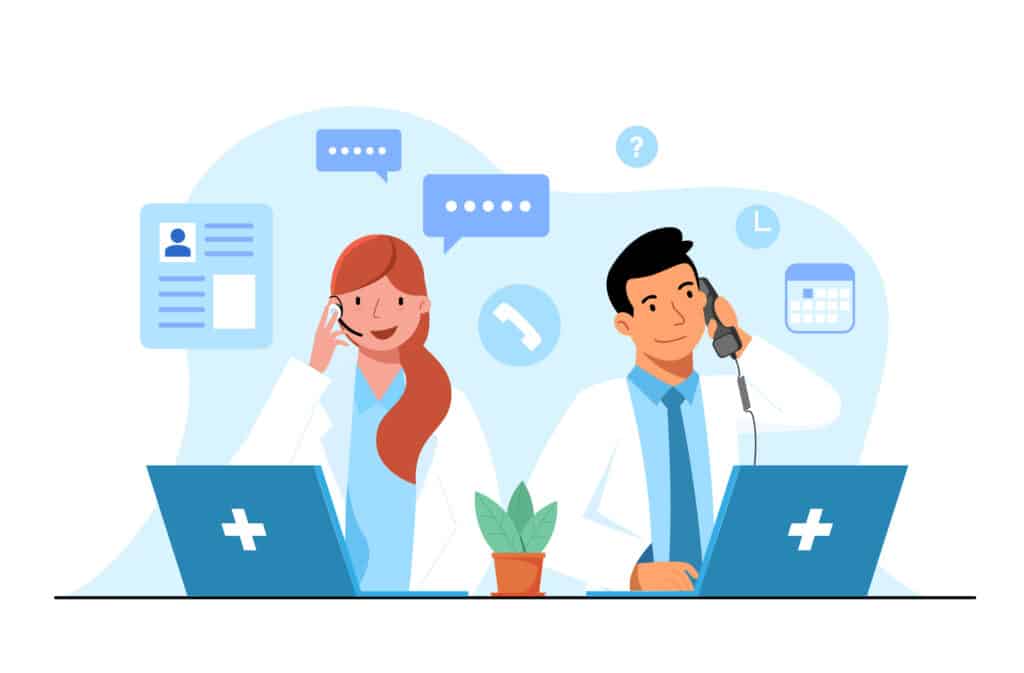Healthcare professionals face increasing pressure to deliver timely, efficient, and accurate responses to patient inquiries — even after hours. In many ways, artificial intelligence (AI) has risen to meet these challenges, especially when it comes to patient communication. By automating workflows, reducing human error, and accelerating response times, AI is laying the foundation for a better medical answering service experience for both patients and providers.
One prime example is TriageLogic’s MedMessage Automate, a HIPAA-compliant platform that uses AI to streamline message intake by guiding patients on how to self-report their symptoms. This technology means that providers receive accurate, prioritized messages, improving both internal operations and continuity of care.
But how exactly is AI driving these advancements — and why should doctors take notice?
How AI Is Transforming Medical Answering Services
AI capabilities have matured significantly over the last few years. In healthcare call centers and answering services, they are being used to replace manual processes, reduce administrative burden, and enhance patient-provider communication. Here are some of the ways that AI can currently help (or may soon help) with the patient experience.
1. Natural Language Processing (NLP) for Smarter Call Intake
Some AI systems with natural language processing capabilities can listen to patients and transcribe their information. Since these systems are trained to understand clinical terminology, regional dialects, and emotional cues, they’re especially powerful in patient-facing settings.
Other automation has the ability to use knowledge of clinical protocols to evaluate patient symptoms as they’re reported, extract keywords, and assign the appropriate urgency to those symptoms.
2. Chatbots and Virtual Assistants for Instant Engagement
AI-powered chatbots can now handle basic patient inquiries, schedule appointments, and collect preliminary symptom data. They operate 24/7 and can assist patients who may not want to speak with a live representative or wait on hold.
Some chatbots can also adapt questions based on previous responses, just like a nurse might. This dynamic, patient-specific questioning improves the quality of information collected when a patient first submits a request — especially during high call volumes, or when a practice has limited staff.
3. Sentiment Analysis and Emotional Intelligence
AI is getting better at evaluating the tone, stress level, and sentiment of a patient’s voice or typed message to determine if the situation may be urgent or emotionally charged.
This can be used to improve the empathetic language that it uses to prompt patients on how to provide the information needed by staff for adequate care.
4. Follow-Up Automation and Patient Engagement
AI supports ongoing patient engagement. Automated follow-ups — such as symptom check-ins, medication reminders, or appointment confirmations — can make patients feel supported between visits. These reminders improve adherence to care plans and reduce preventable readmissions.
For physicians, this means fewer missed appointments and more consistent communication with patients without the added administrative burden.
5. Multilingual and Accessibility Support
AI-driven language translation may soon allow medical services to support multiple languages and communication preferences. This would make healthcare access more equitable for patients who speak languages other than English, or those who rely on text-based communication due to hearing impairments.
This integrated accessibility could also allow providers to maintain compliance with patient rights regulations under the ADA and HIPAA.
6. Predictive Analytics and Workload Management

AI analysis can predict future call volumes, identify staffing gaps, and identify which types of calls are likely to surge based on seasonal trends, local outbreaks, or past behaviors. Using these insights, practices can better allocate resources and prepare for spikes in demand.
For example, a pediatric clinic might receive more after-hours fever-related calls during the winter flu season. Predictive tools anticipate and accommodate these needs ahead of time.
Why MedMessage Automate Sets the Standard
TriageLogic’s MedMessage Automate incorporates some of these AI capabilities into a cohesive platform built specifically for medical practices. Rather than relying on human operators to transcribe and route calls, it sends a secure, mobile-friendly link to patients that can walk them through a dynamic digital intake form.
As patients enter their information, AI assesses symptoms and asks tailored follow-up questions so that critical clinical data isn’t missing or underreported. Messages are then routed securely to the appropriate staff members.
Benefits of MedMessage Automate
- 60%+ reduction in manual message intake.
- 3–7 minutes saved per patient interaction.
- Fewer transcription errors and better documentation.
- Full HIPAA compliance with secure, encrypted communication.
- Available integration with triage workflows and EHRs.
- Happier patients who don’t have to wait on hold.
Most importantly, MedMessage Automate lets doctors focus on what they do best — treating patients — by removing the friction that typically comes with after-hours messages, unclear symptom descriptions, or incomplete patient data.
Smarter Tools Lead to Better Medical Answeirng Service Outcomes
As a doctor, your time is best spent providing care — not administration. By leveraging AI for better medical answering service performance, you can improve the accuracy of symptom intake, reduce your practice’s liability, and make sure that your team receives the right information when patients first reach out to you.
Let’s be clear: AI isn’t here to replace the human element of health care. It’s here to enhance it, especially in areas like patient communication and operations.
MedMessage Automate is proof that when used correctly, AI can transform the way that doctors and patients connect, leading to better health outcomes.
Are You Ready To Elevate Your Medical Answering Service?
Let’s talk about how MedMessage Automate can benefit your practice. Contact us today to schedule a free demo, get answers to your questions, and discuss a customized program!
Plus – if you want additional ways to engage your patients 24/7, we can provide outsourced nurse triage for an after-hours answering service, nurse triage software, and remote patient monitoring!
About TriageLogic
TriageLogic is a URAC-accredited, physician-led provider of top-quality nurse telehealth technology, remote patient monitoring, and medical call center solutions. Founded in 2006, the TriageLogic Group now serves more than 22,000 physicians and covers over 42 million lives nationwide.





